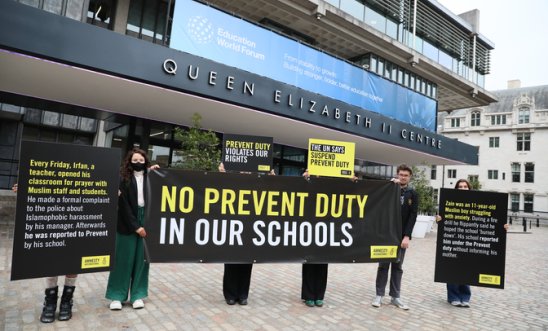
Press releases
Amnesty International call for Prevent Duty to be scrapped

- On National Children’s Day, Amnesty International called for the controversial Prevent duty to be scrapped
- Amnesty took their message directly to delegates at the Education World Forum
- 40% of people reported to the UK government’s “Prevent” duty are between 11-15 years old. The vast majority do not meet the criteria for intervention.
On National Children’s Day, Amnesty’s Children’s Human Rights Network called for the UK to scrap the controversial Prevent duty. They took their message directly to delegates at the Education World Forum, a prestigious gathering of global education ministers, hosted by the Department of Education.
Members of the network held signs saying “No "Prevent" duty in our Schools”, “Students not Suspects”, “Teachers not Spies” and more, and gave out information to show how Prevent violates people’s rights in the UK and negatively impacts children’s education.
The UN has called for the suspension of Prevent and has recognised its role in human rights violations [1].
Amnesty’s research has shown that 93% of people reported to the "Prevent" duty do not meet the criteria for intervention, meaning they’re not at risk of being drawn into terrorism. Nevertheless 40% of people reported to the UK government’s “Prevent” duty are between 11-15 years old and 297 children under 10 have been reported to the UK government’s “Prevent” duty.
Amnesty’s research has found examples including 11-year-old Zain, who was referred by his school. During a fire drill, he said he hoped the school “burned down”. Zain had told the school the comment was a “joke” because he was “stressed with the homework” and school rules.
Ilyas Nagdee, Amnesty International UK’s Racial Justice Director, said: “The Prevent Duty is a dangerously broken system and is having a chilling effect on the lives and freedoms of thousands of innocent children. Under 15-year-olds make up over 40% of those reported which can severely impact their lives and futures. Yet in the vast majority of cases they don’t meet the criteria for intervention.
One of the key issues is the distrust Prevents builds from students with the very teachers and staff they should be able to go to for care and guidance. Moreover, it causes many self-censor out of fear of being reported. This includes modifying their behaviour, refraining from joining campaigning groups and attending protests or expressing their religious and political views.
The Government should listen to the UN and recognise that the Prevent Duty is a human rights violation and suspend it immediately.”